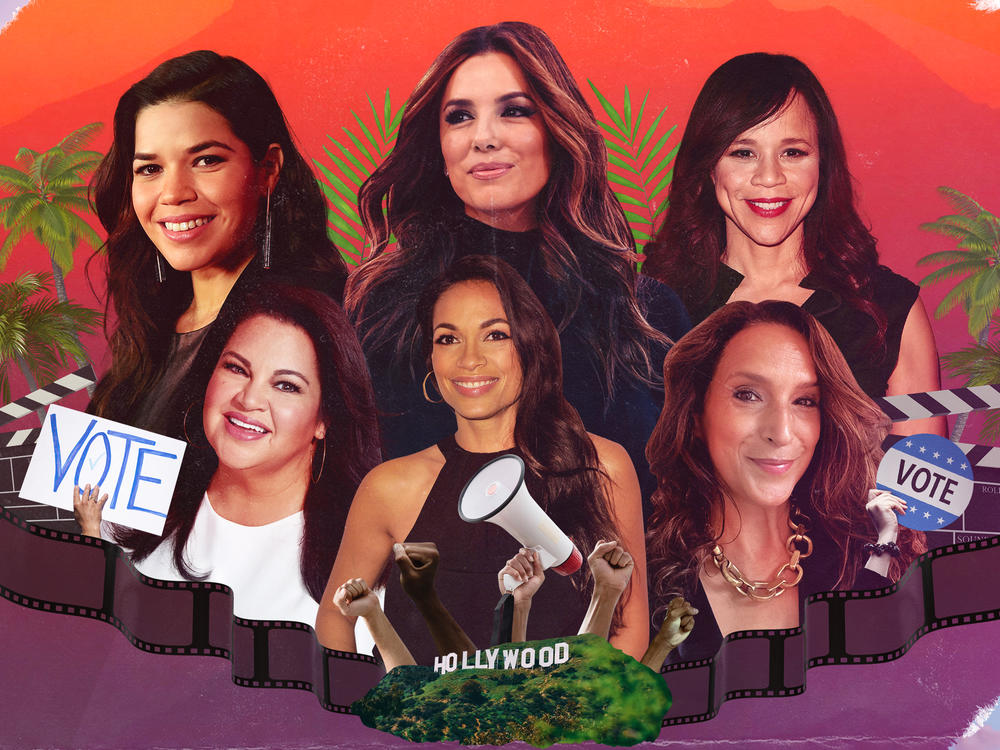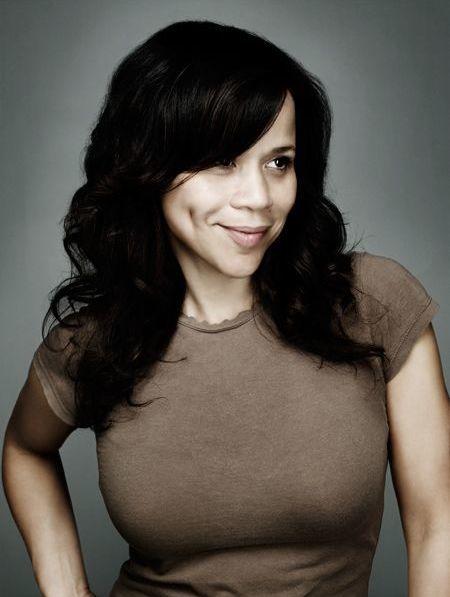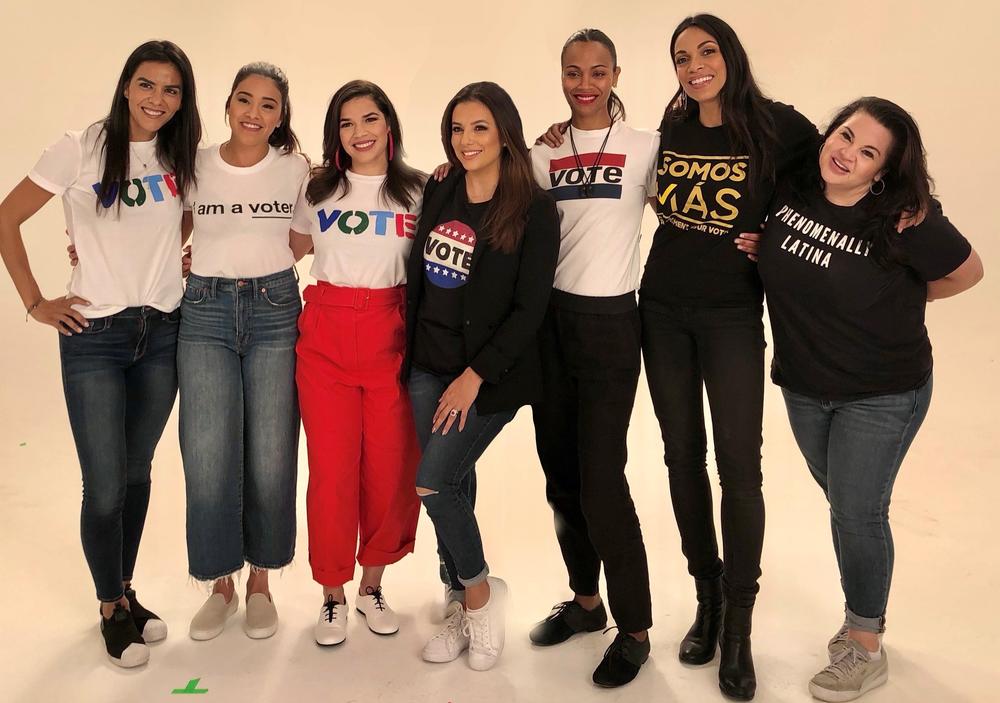Section Branding
Header Content
So few Latinas make it in Hollywood – those who do are pushing for representation
Primary Content
Updated October 13, 2022 at 3:06 PM ET
Fewer than two percent of leading movie roles go to Latino actresses, according to USC's Annenberg Inclusion Initiative. But those who do make it also multitask as directors, producers and activists.
Rosie Perez is one of the Latina powerhouses shaking things up in Hollywood. She blasted onto the big screen in 1989, dancing like a prizefighter in the opening credits of Do the Right Thing.
She remembers how she was discovered: as a college biochemistry major who danced on TV's Soul Train. She met filmmaker Spike Lee at a nightclub.
"He kept saying, 'tonight is fate.' And I said, 'Oh, you wish.' He just couldn't stop laughing," she recalls. "The next day he was like, 'I want you to try out for a film.' And I said, 'I'm not an actress.' And he goes, 'Oh, yes, you are.'"
Lee cast the Brooklyn-born Puertorriqueña in Do the Right Thing. She went on to star in the 1992 film White Men Can't Jump and the 1993 drama Fearless, for which she earned an Oscar nomination. Today, she's in no fewer than four TV shows, including The Flight Attendant. But for many years, Perez says she turned down offensive roles. She fired agents who told her to get a nose job and color her hair blonde.
"I was raising my hand and saying, 'hello, this town is racist. Why isn't anyone saying anything?'"
Perez didn't just call out Hollywood. In 2015 on The View, the talk show for which she was the first Latina cohost, she took on racism. "There is a secret in the Latin communities," she said. "They never want to be in the same group as Black people. And it's sad. It's very, very sad."
As an activist, Perez protested U.S. weapons training in Puerto Rico and she was on President Obama's advisory council on AIDS and HIV. Perez co-hosts the Latino affinity group for the Academy of Motion Picture Arts and Sciences. "We're trying to move the needle as to inclusion in front and behind the scenes of Hollywood," she says.
Marketing and publicity ace Ivette Rodriguez is the cohost of the group. "When Hollywood says they can't find Latinos, it's just absolutely not true. They are there, the stories are there," says Rodriguez. "They need access, but we need to help them with what happens when you get there. How are you presenting yourself? What is that elevator pitch?"
Rodriguez also heads up an organization called LA Collab, which recently signed a deal with Amazon to build a networking platform to match Latinos with jobs, mentors and funding.
Meanwhile, even big-name Latina actresses have to navigate the industry and clarify their identities. Two A-listers made a joke of it at the Golden Globes ceremony in 2016.
"Hi I'm Eva Longoria, not Eva Mendez," the actress said onstage.
"And hi, I'm America Ferrera, not Gina Rodriguez," said her co-presenter.
"And neither one of us are Rosario Dawson," Longoria added.
"Well said, Salma," Ferrera replied, to which Longoria said, "Thank you, Charo."
For years, Eva Longoria Bastón and America Ferrera have been crusading for more Latino representation in Hollywood.
"I don't think there's studios and networks evil -plotting 'let's not hire women and let's not hire Latinos,'" Longoria told NPR. "I think they just unconsciously hire who looks like them, the stories that feel most familiar to them. And so it's about changing those rooms. We are becoming the creators."
Tex-Mexican American Longoria got her big break in 2001 on the TV soap opera The Young and the Restless and became known for her role in the show Desperate Housewives. She produced Devious Maids, directed for Jane the Virgin, was producer and director of Telenovela and an executive producer of Gordita Chronicles.
"I've always been a producer-director turned actor because I'm bossy and I'm really good at it," Longoria said, chuckling. "But I always saw myself directing 'cause I was like, 'Oh my God, nobody's telling these stories. I'm going to have to jump behind the camera and do it myself.'"
Longoria recently wrapped production of Flamin' Hot, her first feature film as director. She's built her portfolio for years so she "could get to a point where she didn't need permission to do things.
"I'm just going to do what I want, hire who I want, and tell the stories that I want," she told NPR. "That, for me, is stories from the Latinx community. We have heroes, we have fairy tales, we have success stories. And I think our community deserves to see them."
America Ferrera starred on the TV show Ugly Betty and became the first Latina to win an Emmy as a leading actress in a comedy. She was born in Los Angeles to Honduran parents and made her acting debut in the 2002 film Real Women Have Curves. Her credits include the film The Sisterhood of the Traveling Pants and the TV comedy Superstore, which she co-produced. Ferrera recently made her directorial debut with the Netflix film I Am Not Your Perfect Mexican Daughter.
Ferrera told NPR she sees a disturbing trend with many Latino-led shows and films. "When budgets shrink, when companies are having a difficult time, our projects are the first to go. We're seen as the biggest risk. We're seen as the biggest unknown factor. We're treated as, you know, the pet project, the pro bono work."
Ferrera and Longoria both say diversity and inclusion make business sense. So does their friend Christy Haubegger, who founded the magazine Latina in 1996 and was a Hollywood producer and agent before she became an executive at WarnerMedia. Haubegger told NPR she, Longoria, Ferrera and others are trying to convince Hollywood they can benefit from nearly 63 million Latinos in the U.S.
"I want you to want to be the platform that tells our stories because you want to win 20% of the American audience, right?" Haubeggar said. "You want to win the trillions of dollars in spending power we have. You want to win our overperformance at the box office."
The activism by these Latinas has gone beyond Hollywood. Ferrera once gave a TED Talk about empowerment. Longoria opened the 2020 Democratic National Convention. Along with Rosario Dawson, Zoe Saldana and Gina Rodriguez, they've rallied Latinas to vote in local and national elections.
"The work that they have been doing to make democracy work is absolutely, absolutely, absolutely critical," says Dolores Huerta, now age 92. The Chicana icon has been a labor leader and civil rights activist since the 1960s. "A lot of Latinos feel that their voice is not important, that their vote isn't important. And when they see people like Eva, America, Rosie Perez, Rosario Dawson, it really inspires them, especially the young people."
Ferrera says one of the largest barriers for Latinas politically has been a lack of confidence. "It's not surprising in a cultural landscape where you don't see yourself reflected," she says.
That's why she, Longoria and Haubegger helped start a movement called Poderistas (that's Spanish for 'powerful women'). In October, a group of poderistas was at the White House meeting with the First Lady and all the Latina staffers. The Poderistas have social media platforms devoted to empowerment.
"The goal's to not just say your vote matters or your face on television screen matters. It's to say your life matters," says Ferrera.
She and her Hollywood hermanas travel the country encouraging Latinas to see themselves as stars.
Copyright 2022 NPR. To see more, visit https://www.npr.org.
Correction
An earlier version of this story incorrectly referred to Salma Hayek as "Selma."



